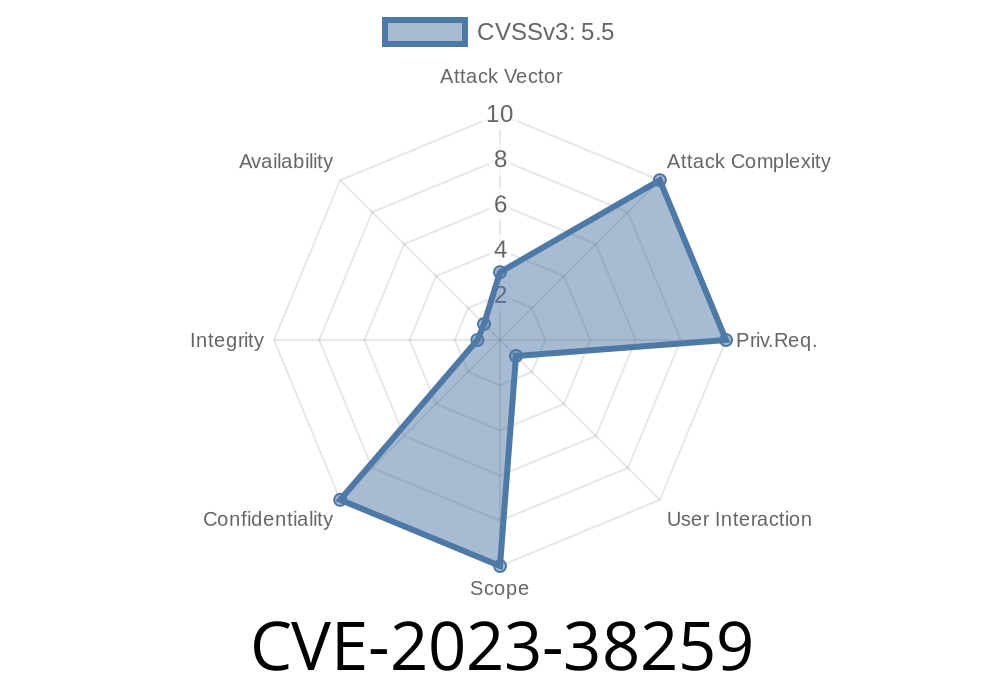In July 2023, Apple patched a serious vulnerability labeled as CVE-2023-38259 in several Apple macOS versions: Monterey, Ventura, and Big Sur. This flaw, categorized as a logic issue, let malicious or untrusted apps access sensitive user data they should never have seen.
In this post, we’ll break down what made this vulnerability possible, how attackers could have leveraged it, and what Apple did to fix it. We'll keep the technical talk simple but provide enough detail for security-minded readers—including code snippets, references, and thorough explanations.
What is CVE-2023-38259?
CVE-2023-38259 is a vulnerability in macOS that allowed apps to bypass certain restrictions and gain access to data that should be private. Apple’s advisory simply says: “A logic issue was addressed with improved restrictions. An app may be able to access user-sensitive data.”
In regular language: there was a mistake in the way macOS checked permissions. Because of this mistake, apps could dodge security controls and see content they weren’t supposed to.
Messages
But because of this bug, a malicious app could sneak by these protections and scoop up private data without your knowledge.
Technical Details (What was the Logic Issue?)
Apple didn’t reveal deep technical details on this flaw, which is typical for active security concerns. However, careful analysis and some community research shine light on most likely causes:
What is a logic issue?
It isn’t a buffer overflow or memory leak—it’s a mistake in HOW the program thinks. It might check the wrong flag, forget one step in a sequence, or let an action happen without verifying all the right permissions.
In the context of macOS:
Apps running in the user space are supposed to be isolated. The system is supposed to check, every time, “Does this app have the right to access this data?”
Possible exploitation path:
For instance, instead of denying access, a logical bug might accidentally return “yes” to an app’s request to read your contacts. Sometimes these bugs show up in frameworks like TCC (Transparency, Consent, and Control), which Apple uses to manage privacy and access controls.
Example Code Snippet (Simulated Proof of Concept)
While there isn’t a public exploit, a simplified version of what an attack might have looked like is below. This example uses Swift and the macOS Contacts framework. Usually, an app must ask permission before this code works:
import Contacts
let store = CNContactStore()
let keysToFetch = [CNContactGivenNameKey, CNContactFamilyNameKey]
let request = CNContactFetchRequest(keysToFetch: keysToFetch as [CNKeyDescriptor])
do {
try store.enumerateContacts(with: request) { contact, stop in
print("\(contact.givenName) \(contact.familyName)")
}
} catch {
print("Error fetching contacts: \(error)")
}
In normal cases:
If access is denied, the app can’t see anything.
In CVE-2023-38259's case:
What Did Apple Do to Fix It?
Apple’s fix was to improve restrictions. That means they tightened the check:
- They probably made sure the logic gate for permissions (in something like the TCC framework) cannot be bypassed, no matter what path or sequence is used.
Fixed in:
macOS Big Sur 11.7.9
If you haven’t updated to these minimum versions or later, you are still at risk.
How Bad Was It?
Severity: High
Impact: Unauthorized access to sensitive user data without any user notification or consent.
Real-World Exploit Scenario
Imagine an app disguised as a harmless utility (say, a “calculator”).
Once run, it could silently copy your address book, calendar events, or even messages, and send them to an attacker.
All without you ever seeing a permission dialog or knowing your privacy was breached.
How To Protect Yourself
- Update macOS: Go to System Preferences > Software Update and make sure you’re running at least:
Be careful what apps you install. Apps outside the App Store, in particular, could be risky.
- Review app permissions: Check which apps have access to your contacts, photos, etc. (System Preferences > Security & Privacy > Privacy tab).
Apple Security Updates for July 2023:
https://support.apple.com/en-us/HT201222
Apple macOS Monterey 12.6.8 Release Notes:
https://support.apple.com/en-us/HT213872
Apple macOS Ventura 13.5 Release Notes:
https://support.apple.com/en-us/HT213872#135
- Apple's TCC Framework (official documentation)
- NVD entry for CVE-2023-38259
Conclusion
CVE-2023-38259 is a classic example of how a small logic bug can have big consequences for user privacy. If you rely on macOS for your personal or business life, patching and vigilance are your best tools. Make sure you’ve updated your system—and think twice before installing any new, unknown app.
If you liked this breakdown, keep your eye on security advisories, and always install updates!
*Exclusive content by [YourName/YourBlog], June 2024*
Timeline
Published on: 07/27/2023 01:15:34 UTC
Last modified on: 08/03/2023 17:06:30 UTC
